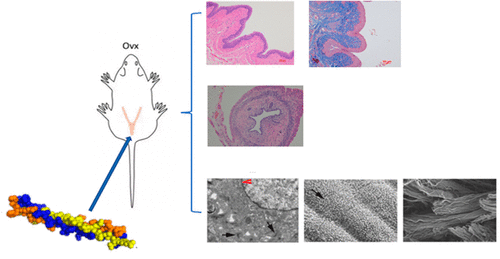当前位置:
X-MOL 学术
›
ACS Biomater. Sci. Eng.
›
论文详情
Our official English website, www.x-mol.net, welcomes your
feedback! (Note: you will need to create a separate account there.)
Intravaginal Administration of Human Type III Collagen-Derived Biomaterial with High Cell-Adhesion Activity to Treat Vaginal Atrophy in Rats
ACS Biomaterials Science & Engineering ( IF 5.4 ) Pub Date : 2020-03-16 , DOI: 10.1021/acsbiomaterials.9b01649 Shuang You 1 , Shuaibin Liu 1 , Xiaojing Dong 1 , Hu Li 1 , Yun Zhu 2 , Lina Hu 1
ACS Biomaterials Science & Engineering ( IF 5.4 ) Pub Date : 2020-03-16 , DOI: 10.1021/acsbiomaterials.9b01649 Shuang You 1 , Shuaibin Liu 1 , Xiaojing Dong 1 , Hu Li 1 , Yun Zhu 2 , Lina Hu 1
Affiliation

|
Vaginal atrophy (VA) is the thinning and drying of the vaginal walls, which can lead to a variety of symptoms. VA is usually initiated by decreasing estrogen levels in post-menopausal women; so, the traditional treatment of VA is hormone therapy (HT). Here, we sought nonhormonal therapies aimed at treating this condition safely and effectively. Collagen is an excellent biomaterial and has important biological functions in skin and mucosal tissues. In particular, collagen can bind to epithelial cells to promote proliferation and differentiation. In this study, recombinant protein T16, which was derived from human type III collagen to provide potent cell-adhesion activity, was used as a safe alternative therapy to treat VA in ovariectomy rat models. After T16 was administered intravaginally for 2 weeks, the autologous collagen arrangement was improved in the epithelium and muscle layer of the rat vagina, and the thickness of epithelium tissue also increased significantly. Compared with the sham group, collagen therapy was found to influence the expression levels of several important proteins in the vaginal tissue, resulting in the upregulation of TIMP-1, Collagen I, Collagen III, Ki-67, VEGF, and AQP-2 and the downregulation of MMP-1 and IL-6. Cells in the collagen treatment group exhibited better proliferation and less apoptosis properties. These results not only provide support for additional animal experiments to further evaluate collagen therapy in VA treatment but also suggest the potential for wide applications of collagen biomaterials with high cell-adhesion activities.
中文翻译:

阴道内施用具有高细胞粘附活性的人类III型胶原衍生生物材料治疗大鼠阴道萎缩
阴道萎缩(VA)是阴道壁的变薄和干燥,可导致多种症状。VA通常是通过降低绝经后女性体内的雌激素水平来引发的。因此,VA的传统治疗方法是激素治疗(HT)。在这里,我们寻求非激素疗法,旨在安全有效地治疗这种情况。胶原蛋白是一种出色的生物材料,在皮肤和粘膜组织中具有重要的生物学功能。特别地,胶原蛋白可以结合上皮细胞以促进增殖和分化。在这项研究中,来源于人III型胶原蛋白以提供有效的细胞粘附活性的重组蛋白T16被用作治疗卵巢切除大鼠模型中VA的安全替代疗法。阴道内施用T16 2周后,大鼠阴道上皮和肌肉层的自体胶原蛋白排列得到改善,上皮组织的厚度也明显增加。与假手术组相比,发现胶原蛋白治疗会影响阴道组织中几种重要蛋白质的表达水平,从而导致TIMP-1,I型胶原,III型胶原,Ki-67,VEGF和AQP-2和MMP-1和IL-6的下调。胶原治疗组中的细胞表现出更好的增殖和更少的凋亡特性。这些结果不仅为进一步评估VA治疗中的胶原蛋白疗法的其他动物实验提供支持,而且还表明具有高细胞粘附活性的胶原蛋白生物材料的广泛应用潜力。上皮组织的厚度也明显增加。与假手术组相比,发现胶原蛋白治疗会影响阴道组织中几种重要蛋白质的表达水平,从而导致TIMP-1,I型胶原,III型胶原,Ki-67,VEGF和AQP-2和MMP-1和IL-6的下调。胶原治疗组中的细胞表现出更好的增殖和更少的凋亡特性。这些结果不仅为进一步评估VA治疗中的胶原蛋白疗法的其他动物实验提供支持,而且还表明具有高细胞粘附活性的胶原蛋白生物材料的广泛应用潜力。上皮组织的厚度也明显增加。与假手术组相比,发现胶原蛋白治疗会影响阴道组织中几种重要蛋白质的表达水平,从而导致TIMP-1,I型胶原,III型胶原,Ki-67,VEGF和AQP-2和MMP-1和IL-6的下调。胶原治疗组中的细胞表现出更好的增殖和更少的凋亡特性。这些结果不仅为进一步评估VA治疗中的胶原蛋白疗法的其他动物实验提供支持,而且还表明具有高细胞粘附活性的胶原蛋白生物材料的广泛应用潜力。发现胶原蛋白疗法会影响阴道组织中几种重要蛋白的表达水平,从而导致TIMP-1,I型胶原,III型胶原,Ki-67,VEGF和AQP-2的上调以及MMP-1的下调和IL-6。胶原治疗组中的细胞表现出更好的增殖和更少的凋亡特性。这些结果不仅为进一步评估VA治疗中的胶原蛋白疗法的其他动物实验提供支持,而且还表明具有高细胞粘附活性的胶原蛋白生物材料的广泛应用潜力。发现胶原蛋白疗法会影响阴道组织中几种重要蛋白质的表达水平,从而导致TIMP-1,I型胶原,III型胶原,Ki-67,VEGF和AQP-2的上调以及MMP-1的下调和IL-6。胶原治疗组中的细胞表现出更好的增殖和更少的凋亡特性。这些结果不仅为进一步评估VA治疗中的胶原蛋白疗法的其他动物实验提供支持,而且还表明具有高细胞粘附活性的胶原蛋白生物材料的广泛应用潜力。
更新日期:2020-04-23
中文翻译:

阴道内施用具有高细胞粘附活性的人类III型胶原衍生生物材料治疗大鼠阴道萎缩
阴道萎缩(VA)是阴道壁的变薄和干燥,可导致多种症状。VA通常是通过降低绝经后女性体内的雌激素水平来引发的。因此,VA的传统治疗方法是激素治疗(HT)。在这里,我们寻求非激素疗法,旨在安全有效地治疗这种情况。胶原蛋白是一种出色的生物材料,在皮肤和粘膜组织中具有重要的生物学功能。特别地,胶原蛋白可以结合上皮细胞以促进增殖和分化。在这项研究中,来源于人III型胶原蛋白以提供有效的细胞粘附活性的重组蛋白T16被用作治疗卵巢切除大鼠模型中VA的安全替代疗法。阴道内施用T16 2周后,大鼠阴道上皮和肌肉层的自体胶原蛋白排列得到改善,上皮组织的厚度也明显增加。与假手术组相比,发现胶原蛋白治疗会影响阴道组织中几种重要蛋白质的表达水平,从而导致TIMP-1,I型胶原,III型胶原,Ki-67,VEGF和AQP-2和MMP-1和IL-6的下调。胶原治疗组中的细胞表现出更好的增殖和更少的凋亡特性。这些结果不仅为进一步评估VA治疗中的胶原蛋白疗法的其他动物实验提供支持,而且还表明具有高细胞粘附活性的胶原蛋白生物材料的广泛应用潜力。上皮组织的厚度也明显增加。与假手术组相比,发现胶原蛋白治疗会影响阴道组织中几种重要蛋白质的表达水平,从而导致TIMP-1,I型胶原,III型胶原,Ki-67,VEGF和AQP-2和MMP-1和IL-6的下调。胶原治疗组中的细胞表现出更好的增殖和更少的凋亡特性。这些结果不仅为进一步评估VA治疗中的胶原蛋白疗法的其他动物实验提供支持,而且还表明具有高细胞粘附活性的胶原蛋白生物材料的广泛应用潜力。上皮组织的厚度也明显增加。与假手术组相比,发现胶原蛋白治疗会影响阴道组织中几种重要蛋白质的表达水平,从而导致TIMP-1,I型胶原,III型胶原,Ki-67,VEGF和AQP-2和MMP-1和IL-6的下调。胶原治疗组中的细胞表现出更好的增殖和更少的凋亡特性。这些结果不仅为进一步评估VA治疗中的胶原蛋白疗法的其他动物实验提供支持,而且还表明具有高细胞粘附活性的胶原蛋白生物材料的广泛应用潜力。发现胶原蛋白疗法会影响阴道组织中几种重要蛋白的表达水平,从而导致TIMP-1,I型胶原,III型胶原,Ki-67,VEGF和AQP-2的上调以及MMP-1的下调和IL-6。胶原治疗组中的细胞表现出更好的增殖和更少的凋亡特性。这些结果不仅为进一步评估VA治疗中的胶原蛋白疗法的其他动物实验提供支持,而且还表明具有高细胞粘附活性的胶原蛋白生物材料的广泛应用潜力。发现胶原蛋白疗法会影响阴道组织中几种重要蛋白质的表达水平,从而导致TIMP-1,I型胶原,III型胶原,Ki-67,VEGF和AQP-2的上调以及MMP-1的下调和IL-6。胶原治疗组中的细胞表现出更好的增殖和更少的凋亡特性。这些结果不仅为进一步评估VA治疗中的胶原蛋白疗法的其他动物实验提供支持,而且还表明具有高细胞粘附活性的胶原蛋白生物材料的广泛应用潜力。











































 京公网安备 11010802027423号
京公网安备 11010802027423号